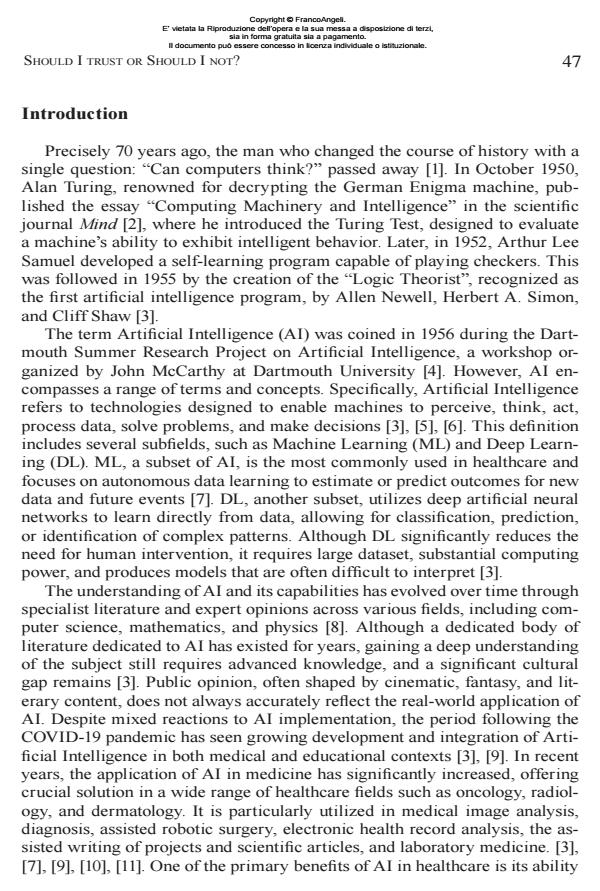“Should I trust or Should I not?” A Survey to measure AI Confidence Levels Among Students of the bachelor’s degree in Psychiatric Rehabilitation Techniques and Psychiatry Residents. Introduction
Titolo Rivista RIVISTA SPERIMENTALE DI FRENIATRIA
Autori/Curatori Erika De Marco, Mariano Virga, Martina Torresi, Sara Catellani, Luca Pingani, Giulia Ferrazzi
Anno di pubblicazione 2024 Fascicolo 2024/3
Lingua Inglese Numero pagine 23 P. 45-67 Dimensione file 845 KB
DOI 10.3280/RSF2024-003004
Il DOI è il codice a barre della proprietà intellettuale: per saperne di più
clicca qui
Qui sotto puoi vedere in anteprima la prima pagina di questo articolo.
Se questo articolo ti interessa, lo puoi acquistare (e scaricare in formato pdf) seguendo le facili indicazioni per acquistare il download credit. Acquista Download Credits per scaricare questo Articolo in formato PDF

FrancoAngeli è membro della Publishers International Linking Association, Inc (PILA), associazione indipendente e non profit per facilitare (attraverso i servizi tecnologici implementati da CrossRef.org) l’accesso degli studiosi ai contenuti digitali nelle pubblicazioni professionali e scientifiche.
The use of Artificial Intelligence (AI) in mental health context has significantly expanded in recent years, offering innovative solutions in various clinical settings. This study investigates the levels of trust and familiarity with AI among psychiatric rehabilitation students (PRTS) and psychiatric residents (PR) at the University of Modena and Reggio Emilia. Methods: An online questionnaire developed by the University of Twente was administered using the REDCap platform to collect data from 78 participants, including 53 PRTS and 25 PRs. Results: The findings revealed that 80% of PRTS reported familiarity with AI, compared to less than 50% of PRs. However, only 42.6% of PRTS and 22.5% of PRs felt familiar with AI chatbots. Trust in AI-driven recommendations was generally neutral across both groups, with 40.8% of respondents expressing neither agreement nor disagreement. Additionally, over 68% of PRTS and 70.8% of PRs expressed confidence in their ability to generate high-quality ideas. Conclusion: A more structured AI education within medical training is needed to bridge the gap between familiarity and trust. AI, with its continuous advancements, offers substantial potential in healthcare, bringing with it both opportunities and risks.
L’utilizzo dell’Intelligenza Artificiale (AI) nel contesto della salute mentale si è notevolmente ampliata negli ultimi anni, offrendo soluzioni innovative in diversi contesti clinici. Questo studio indaga i livelli di fiducia e di familiarità con l’AI tra gli studenti di riabilitazione psichiatrica (PRTS) e gli specializzandi in psichiatria (PR) dell’Università degli Studi di Modena e Reggio Emilia. Metodi: È stato somministrato un questionario online sviluppato dall’Università di Twente utilizzando la piattaforma REDCap per raccogliere i dati di 78 partecipanti, tra cui 53 PRTS e 25 PR. Risultati: I risultati hanno rivelato che l’80% dei PRTS ha dichiarato di avere familiarità con l’IA, rispetto a meno del 50% dei PR. Tuttavia, solo il 42.6 % dei PRTS e il 22.5% dei PR si sentivano familiari con i chatbot di IA. La fiducia nelle raccomandazioni guidate dall’IA è stata generalmente neutra in entrambi i gruppi, con il 40.8% degli intervistati che non ha espresso né accordo né disaccordo. Lo studio ha inoltre rilevato che oltre il 68% dei PRTS e il 70.8% dei PR sono fiduciosi nella loro capacità di formulare idee di alta qualità. Conclusioni: È necessaria una formazione più strutturata sull’AI all’interno della formazione nel contesto della salute mentale per colmare il divario tra familiarità e fiducia. L’AI, con i suoi continui progressi, offre un potenziale sostanziale nell’assistenza sanitaria, portando con se sia opportunità che rischi.
Parole chiave:Confidenza nell’AI, Studenti, Università, AI Chatbot
Erika De Marco, Mariano Virga, Martina Torresi, Sara Catellani, Luca Pingani, Giulia Ferrazzi, “Should I trust or Should I not?” A Survey to measure AI Confidence Levels Among Students of the bachelor’s degree in Psychiatric Rehabilitation Techniques and Psychiatry Residents. Introduction in "RIVISTA SPERIMENTALE DI FRENIATRIA" 3/2024, pp 45-67, DOI: 10.3280/RSF2024-003004